SystmConnect
SystmConnect is free to use for NHS patients. Use SystmConnect to ask us about your health symptoms, conditions or treatment. You can even request things like sick notes and GP letters. You can sign in using your NHS App credentials, which then automatically links to your patient record, or you can continue as a guest. Click the link below to use SystmConnect.
Self Care – Stay Well
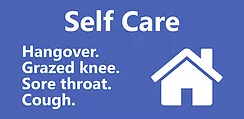 Self-care is perfect if your condition is something you will be able to treat at home. In fact, home is the best place for you. A big part of your recovery from minor ailments is to rest and drink plenty of fluids. You can plan ahead by stocking up on healthcare essentials you might need, like paracetamol. Ask your pharmacist for advice on stocking your medicines cabinet. Self-care is about keeping fit and healthy and understanding when to get advice.
Self-care is perfect if your condition is something you will be able to treat at home. In fact, home is the best place for you. A big part of your recovery from minor ailments is to rest and drink plenty of fluids. You can plan ahead by stocking up on healthcare essentials you might need, like paracetamol. Ask your pharmacist for advice on stocking your medicines cabinet. Self-care is about keeping fit and healthy and understanding when to get advice.
Stocking Your Medicines Cabinet
NHS Choices – Information
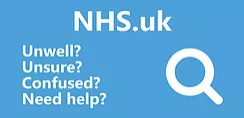 Your complete guide to conditions, symptoms and treatments, including what to do and when to get help.
Your complete guide to conditions, symptoms and treatments, including what to do and when to get help.
NHS Choices puts patients in the driving seat, giving them access to information not previously available to them so they can make informed decisions from advice about healthy eating to identifying the right hospital for their treatment.
Pharmacies – Basic Care
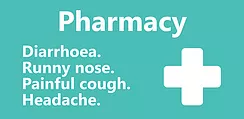 Local pharmacies can offer you fast and convenient clinical advice for a wide range of minor health concerns, with no appointment needed. Most community pharmacies can now offer a private consultation room if you need to have a private conversation.
Local pharmacies can offer you fast and convenient clinical advice for a wide range of minor health concerns, with no appointment needed. Most community pharmacies can now offer a private consultation room if you need to have a private conversation.
Pharmacists are experts on medicines and how they work. They’re also able help you decide whether you need to see a doctor.
GP Surgery – Routine Care
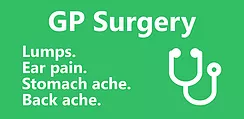 General practitioners (GPs) treat all common medical conditions and refer patients to hospitals and other medical services for urgent and specialist treatment. They focus on the health of the whole person combining physical, psychological and social aspects of care. Your local surgery provides a range of services, including general medical advice and treatment, prescriptions, referral to a specialist or hospital, immunisations and tests.
General practitioners (GPs) treat all common medical conditions and refer patients to hospitals and other medical services for urgent and specialist treatment. They focus on the health of the whole person combining physical, psychological and social aspects of care. Your local surgery provides a range of services, including general medical advice and treatment, prescriptions, referral to a specialist or hospital, immunisations and tests.
NHS 111 – Advice & OOH
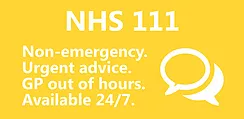 For urgent medical needs that are not emergencies, NHS 111 is a free national phone number able to provide advice at any time on where and how to receive the most appropriate treatment. You can call 111 when your surgery is closed.
For urgent medical needs that are not emergencies, NHS 111 is a free national phone number able to provide advice at any time on where and how to receive the most appropriate treatment. You can call 111 when your surgery is closed.
The phone service and website are open 24 hours a day, 7 days a week. If you need a translator you can ask for one.
Walk-In Centres – Urgent Care
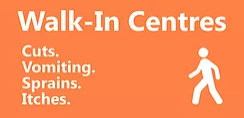 NHS walk-in centres offer fast and convenient access to healthcare advice and treatment for minor injuries and illnesses. They are open from early morning to late evening, seven days a week. They are run by experienced NHS nurses, and you don’t need to make an appointment. Minor Injuries Units are for patients with less serious injuries, such as sprains, cuts and grazes. You do not need an appointment to visit an MIU.
NHS walk-in centres offer fast and convenient access to healthcare advice and treatment for minor injuries and illnesses. They are open from early morning to late evening, seven days a week. They are run by experienced NHS nurses, and you don’t need to make an appointment. Minor Injuries Units are for patients with less serious injuries, such as sprains, cuts and grazes. You do not need an appointment to visit an MIU.
Trowbridge and Chippenham – MIU
A&E or 999 – Emergencies
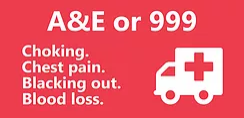 It is often very obvious when emergency care is needed for serious injury or illness. You should get medical attention by either taking the patient to the nearest Accident & Emergency department or by calling 999 for an emergency ambulance. An emergency is a life threatening situation such as heavy blood loss, suspected broken bones, persistent chest paint, difficulty breathing, loss of consciousness, overdosing or poisoning.
It is often very obvious when emergency care is needed for serious injury or illness. You should get medical attention by either taking the patient to the nearest Accident & Emergency department or by calling 999 for an emergency ambulance. An emergency is a life threatening situation such as heavy blood loss, suspected broken bones, persistent chest paint, difficulty breathing, loss of consciousness, overdosing or poisoning.
A&E Royal United Hopsitals Bath
A&E Salisbury District Hospital
Hospital – Planned Care
Helpful information and guidance for patients waiting for a hospital consultation, treatment or surgery.
Children’s health
Pharmacies
Pharmacists are trained medicine experts who can give you advice on treating a range of common childhood conditions and minor injuries such as:
- sore throat
- coughs
- colds and flu
- insect bites
- earache
- skin rashes
You don’t need to make an appointment to visit your local pharmacist, and many pharmacies are open during the evening and at weekends. Find your nearest pharmacy.
HANDi App
Parents, carers and healthcare professionals can access expert advice about common childhood illnesses and how to treat them via a free mobile app, called HANDi App.
Developed and approved by Paediatric Consultants at the Royal United Hospital (RUH), the HANDi App provides expert advice on how best to manage the six most common childhood illnesses; diarrhoea and vomiting, high temperature, chestiness, newborn problems and stomach pain. The HANDi App aims to give parents and carers more confidence in dealing with minor conditions at home.
It’s easy to use as it takes the user through a series of questions about the symptoms their child is experiencing and then advises on the best course of action, whether that’s to treat at home, make a GP appointment or to go to A&E.
Bath and Wiltshire residents can search for ‘HANDi App’ in their app store to download it.
To find out more about the HANDi App, visit the RUH website.
Useful links
When Should I worry Booklet (available in multiple languages)
Little Orange book: Expert advice on looking after babies and young children when they’re poorly
Respiratory illness in children


